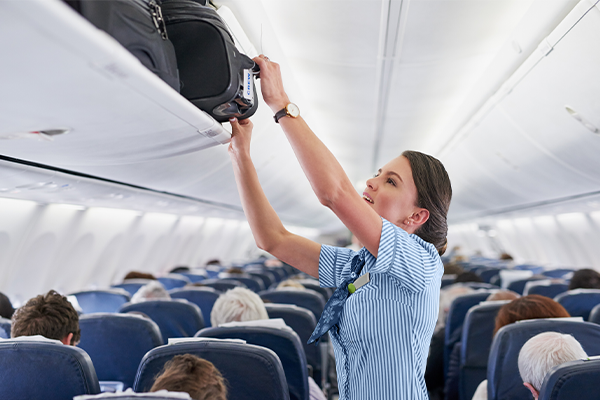
A day in the life of a flight attendant often involves exhausting physical demands: pushing and pulling service carts, lifting heavy luggage, and standing for hours in airplane cabins.
A recent study by Duke University School of Medicine and the U.S. Centers for Disease Control and Prevention finds that female flight attendants who perform these strenuous tasks experience more intense menstrual cramps and irregular cycles.
Since the 1960’s, studies have documented menstrual irregularities, severe cramping, and heavier menstrual flows among flight attendants. The latest study published Jan. 13 in Occupational & Environmental Medicine, a BMJ journal, stands out for looking at how occupational exposures play a role in painful periods.
It is also one of the few studies that address women’s health in the workplace. Most occupational health research focuses on men and the health challenges they face while working in male-dominated fields like coal mining and construction.
“This study highlights a link between work and health outcomes we don’t typically think of,” said Candice Y. Johnson, PhD, assistant professor in the Department of Family Medicine and Community Health at Duke medical school.

In the United States, 85% of women endure painful periods, and more than one-third of them cannot perform daily activities, including work, because of their symptoms. “Menstrual cramps affect so many people. If we can do something to help reduce that by even a fraction, it's going to improve the quality of life and productivity for so many people in the workforce,” Johnson said.
The team analyzed data collected for a previous CDC study that compared health conditions of flight attendants versus teachers. In the new study flight attendants reported more physical demands than teachers, with 61% of them describing their workday as hard labor, compared to just 12% of teachers who felt the same.
Flight attendants also reported engaging in activities such as standing for more than eight hours, lifting items weighing around 15 pounds, pushing or pulling items, and bending or twisting at the waist more frequently than teachers.
“Conditions that affect women, especially menstrual cycles, are just seen as a part of life. Menstrual cramps are not deadly conditions, but they do cause a lot of pain, suffering and lost work time.”
- Candice Y. Johnson, PhD, assistant professor of family medicine
Additionally, flight attendants reported experiencing cramps more often than teachers. According to the study, 61% of flight attendants had moderate to severe cramps compared to 51% of teachers.
“Other studies [unrelated to flight attendants] have shown that frequent heavy lifting is associated with greater menstrual pain. This study was an opportunity to see if physical labor was the reason flight attendants said their cramps were worse while working than when they weren’t,” Johnson said.
Addressing Menstrual Health in the Workplace
Part of Johnson’s motivation for leading this study came from realizing how vastly understudied menstrual cycles are.
“There's plenty of evidence that working conditions influence our health, but a lot of the occupational health literature is based on cohorts of men in male-dominated occupations. While that’s important, conditions that affect women, especially menstrual cycles, are just seen as a part of life,” Johnson said. “Menstrual cramps are not deadly conditions, but they do cause a lot of pain, suffering and lost work time.”
She started the recent study while working as an epidemiologist at the CDC’s National Institute for Occupational Safety and Health (NIOSH). She and her team used data gathered by the CDC for a larger study that compared miscarriage rates in flight attendants to teachers.
Information was collected from 694 flight attendants and 120 teachers from three U.S. cities between 1992 and 2001. They obtained flight records and conducted interviews to collect information on various reproductive health topics.
Due to the volume of data collected, the agency was able to conduct additional studies, like the recent one on menstrual irregularities.
“Publishing this study ... helps raise awareness of how work environment affects things like menstrual health and will encourage others to study it. The more research we can conduct, the more answers we will have,” Johnson said.
“If flight attendants miss work because of menstrual cramps, they’re not getting paid, and the airline is understaffed. You can't fly an airplane without a flight attendant,” Johnson said. “Workers and employers have a shared interest in making sure that everyone is healthy at work and able to come to work.”
Johnson hopes industries will be inspired to enhance their work environment.
“We now know that people who have overall more physically demanding assignments like flight attendants, tend to have more severe menstrual cramps. If there's some aspect of the work environment that is causing more severe cramps, we need to figure out what we can do to improve it.”